 Humans
Humans  Humans
Humans  Movies and TV
Movies and TV The 10 Most Heartwarming Moments in Pixar Films
 Travel
Travel Top 10 Religious Architectural Marvels
 Creepy
Creepy 10 Haunted Places in Alabama
 History
History Top 10 Tragic Facts about England’s 9 Days Queen
 Food
Food 10 Weird Foods Inspired by Your Favorite Movies
 Religion
Religion 10 Mind-Blowing Claims and Messages Hidden in the Bible Code
 Facts
Facts 10 Things You Never Knew about the History of Gambling
 Weird Stuff
Weird Stuff 10 Cool and Creepy Facts about Collecting Tears
 Humans
Humans The Ten Most Lethal Gunslingers of the Old West
 Humans
Humans Ten Historic Men Who Deserve Way More Credit Than They Got
 Movies and TV
Movies and TV The 10 Most Heartwarming Moments in Pixar Films
 Travel
Travel Top 10 Religious Architectural Marvels
Who's Behind Listverse?

Jamie Frater
Head Editor
Jamie founded Listverse due to an insatiable desire to share fascinating, obscure, and bizarre facts. He has been a guest speaker on numerous national radio and television stations and is a five time published author.
More About Us Creepy
Creepy 10 Haunted Places in Alabama
 History
History Top 10 Tragic Facts about England’s 9 Days Queen
 Food
Food 10 Weird Foods Inspired by Your Favorite Movies
 Religion
Religion 10 Mind-Blowing Claims and Messages Hidden in the Bible Code
 Facts
Facts 10 Things You Never Knew about the History of Gambling
 Weird Stuff
Weird Stuff 10 Cool and Creepy Facts about Collecting Tears
 Humans
Humans The Ten Most Lethal Gunslingers of the Old West
10 Super-Scandalous Clergymen
Most denominational forms of Christianity have produced scandalous men throughout the centuries. The Anglican Church is certainly no exception. In spite of their status as ordained and supposedly respectable ministers of the gospel, these clergymen have been desperate criminals or even diabolical murderers. Others have simply been all too human, finding themselves publicly exposed as hypocrites or at the center of great controversies.
10Lancelot Blackburne, Archbishop of York
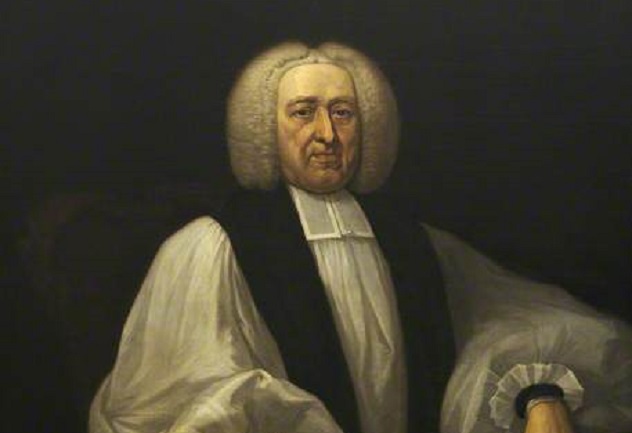
Lancelot Blackburne was a mysterious figure. To this day, his legacy remains steeped in intrigue and scandalous rumor. While the Anglican Church likes to style him as a pious missionary who presumably risked his life serving as a chaplain aboard a Caribbean pirate ship, Blackburne was clearly no innocent. He was widely believed to have indulged in piracy himself.
One story claims that a buccaneer asked about his old shipmate, Blackburne, upon returning to England. The buccaneer was amazed to hear that Blackburne had been installed in no less a position than the archbishopric of York. Besides amassing whatever wealth he might have made at sea, Blackburne is also believed by many to have served as a spy for Charles II. A list of the king’s payments for “Secret Services” notes that £20 was paid to Blackburne in 1681, which was a huge amount of money at that time.
Blackburne married after returning to Britain, but his wife bore him no children. He became the subject of a number of satirical poems and was widely regarded as a womanizer. Thomas Hayter, who became the Bishop of Norwich, seems likely to have been Blackburne’s son, born from an adulterous union with the wife of a Devonshire rector. The Quarterly Review hoped to restore the Archbishop’s reputation in 1822 by publishing Hayter’s baptismal entry from November 17, 1702, which reads “Son of George Hayter, Rector of this parish, and of Grace, his wife.” This is, of course, not definitive evidence of Hayter’s legitimacy. Far more telling is the fact that Blackburne made generous efforts to advance Hayter’s career and left him a large part of his estate.
Start your own religious scandal when you buy a Priest Costume at Amazon.com!
9Reverend James Hackman
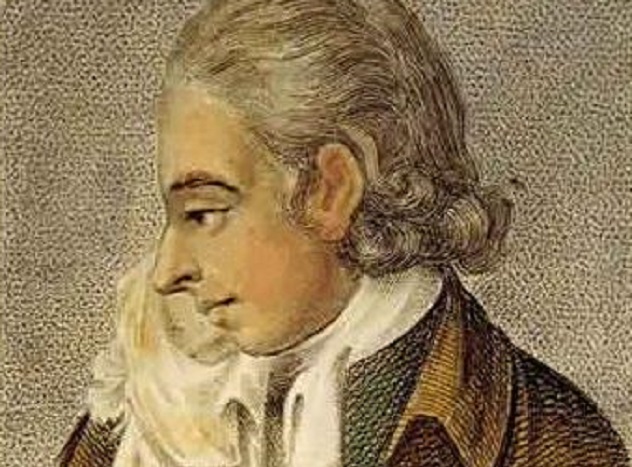
The Reverend James Hackman was executed for murder at Tyburn on April 19, 1779. He began his working life as a lieutenant in the British army, and it was during this period that he first met Martha Ray, mistress of the fourth Earl of Sandwich. She was treated well by the earl and gave birth to nine of his illegitimate children, but she also made the fatal mistake of encouraging Hackman’s affections. Even her friends admitted that Ray and Hackman were lovers and had discussed the possibility of marrying.
The relationship deteriorated when Hackman’s regiment was stationed in Ireland. In 1777, he resigned from the army and took up with the church, becoming the rector of the parish of Wiverton in Norfolk. Still obsessed with Ray, he went to London and made several proposals of marriage. She wrote him a letter asking him to desist, then she went about her life and business.
In Hackman’s mind, it wasn’t over. He followed her to the theater one evening and saw her in the company of another man, whom he apparently assumed to be her new lover. Agitated, he obtained two pistols and waited in a nearby coffee house until the performance ended. As Miss Ray was about to enter her carriage, he caught her by the cloak, spun her around, pressed one of the pistols to her forehead, and shot her dead. He then tried to kill himself with the second pistol, but the shot only grazed him, so he smashed the pistols against his skull, rendering himself unconscious but still alive.
Hackman pleaded not guilty on the grounds of insanity but was convicted to be hanged and dissected in public at the Surgeon’s Hall. Having apparently regained his composure, the clergyman showed great piety and emotional self-control at his execution.
8Reverend Doctor William Dodd
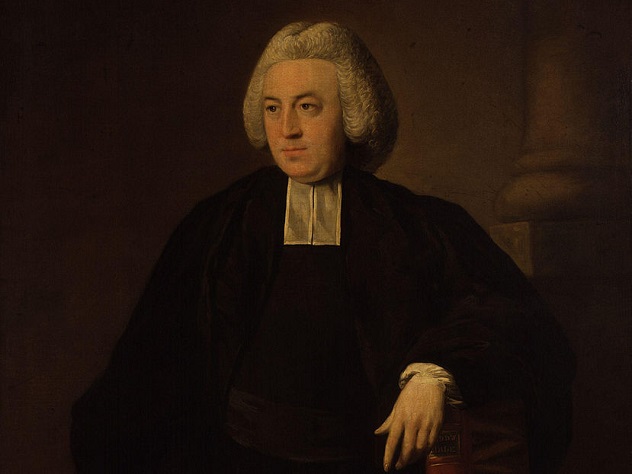
William Dodd originally quit his studies to move to London, where he set himself up as a writer. He married a woman beneath his station and lived a frivolous lifestyle he couldn’t support, but after a visit from his disapproving father, the young William Dodd turned his life around. He became a renowned preacher and academic, eventually gaining a large income as a prebendary of Brecon. He also served for a time as royal chaplain to George III.
At the height of his powers, Doctor Dodd helped establish several charitable organizations, including the Society for the Relief of Poor Debtors. Perhaps it was his own propensity to overspend that inspired him, although he could hardly be said to have been poor. In the end, it was the Dodd’s taste for excessive living that ultimately led to his downfall.
Dodd first disgraced himself by attempting to bribe the Lord Chancellor’s wife, Lady Apsley, to the tune of £3000 in exchange for convincing her husband to grant him a lucrative position that had recently become available. After he was found out, Dodd went abroad for a time, where he continued his extravagant lifestyle. By the time he returned to England, he was a deeply indebted and desperate man. In February 1777, he forged a credit bond of £4000 in the name of Lord Chesterfield, a former pupil. Chesterfield immediately disowned the bond, and an investigation began. Despite an eloquent defense and his attempts to repay the money he’d gained through fraud, Dodd was sentenced to hang by the neck until dead.
Despite his misgivings, Dodd was known as a charitable man who had written much on various humanitarian topics, including an essay that questioned the justice of capital punishment, and he himself received a last, grim act of charity from his executioner. The executioner ran under the gallows when the cart was pulled away and hung from the cleric’s legs to speed the process along.
7Reverend Harold Davidson
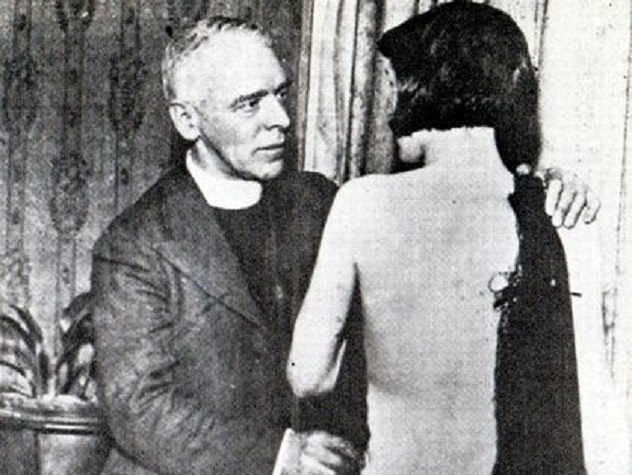
The Reverend Harold Davidson found himself at the center of what turned out to be one of the biggest and most sensational church scandals of the 20th century. He earned himself the title of “the prostitute’s padre” after his work with women of ill repute landed him in serious hot water in 1932. Public opinion was divided, and many still believe that he was innocent of the charges brought against him. However, for a man of the cloth, he certainly put himself in some ill-advised situations.
At the trial of Reverend Davidson, a damning series of photographs showed him caressing semi-naked young women. This behavior was highly inappropriate for a cleric, though Davidson claimed he was only trying to help these women and lead them away from lives of debauchery. He proclaimed his innocence throughout the trial, eventually appealing to the highest Ecclesiastical court, the court of Ashes. Nevertheless, he was found guilty at every stage of the process and formally defrocked at the Norwich Cathedral.
Whether innocent or guilty, Davidson probably made things worse for himself due to his showman-like character. To raise funds for one of his appeals, he exhibited himself in a barrel at the seaside resort of Blackpool. He died in 1937 after being mauled by a lion in whose cage he was delivering a public lecture.
6Reverend Thomas Hunter

The Reverend Thomas Hunter (also known as Robert Irvine) was from Fife, Scotland and educated in divinity at St. Andrews University. He was described as having a gloomy and sensitive nature and had eventually become somewhat obsessed with the doctrine of predestination. Perhaps this was an early sign that his mind was not as it should have been. Surely, however, no one could ever have predicted what his dark and obsessive thinking would eventually lead him to do.
He was appointed chaplain to an eminent merchant living in the vicinity of Edinburgh. He also became tutor to the merchant’s three children. While there, he began a secret affair with a young girl who served the merchant’s wife and daughter. While the merchant and his wife were away, the children discovered Hunter and the girl together in the girl’s room. The children told the merchant when he returned, and the girl was sent away in disgrace. Though Hunter apologized and managed to keep his position, he began to nurse a deep hatred for the children.
After taking the two young boys for a walk in a nearby field, Hunter produced a knife and told them he was going to kill them for what they had done. He kneeled on one of the boys to stop him from escaping, then he slit the other boy’s throat. He dispatched the remaining boy in the same merciless manner.
Hunter apparently didn’t care to avoid capture. He committed the murders in full public view, and though he tried to drown himself in a river, he was soon apprehended. He spent the night in jail, chained to the floor, and pleaded guilty at his trial. His only regret, he claimed, was that he hadn’t been able to murder the merchant’s daughter as well.
The judge decreed that “on the succeeding day he should be executed on a gibbet, erected for that purpose on the spot where he had committed the murders; but that, previous to his execution, his right hand should be cut off with a hatchet, near the wrist; that then he should be drawn up to the gibbet by a rope, and when he was dead, hung in chains between Edinburgh and Leith, the knife with which he committed the murders being stuck through his hand, which should be advanced over his head and fixed therewith to the top of the gibbet.” Hunter was executed according to these instructions on August 22, 1700. The Reverend’s last words were “There is no God—I do not believe there is any or if there is, I hold him in defiance.”
5Percy Jocelyn, Bishop of Clogher
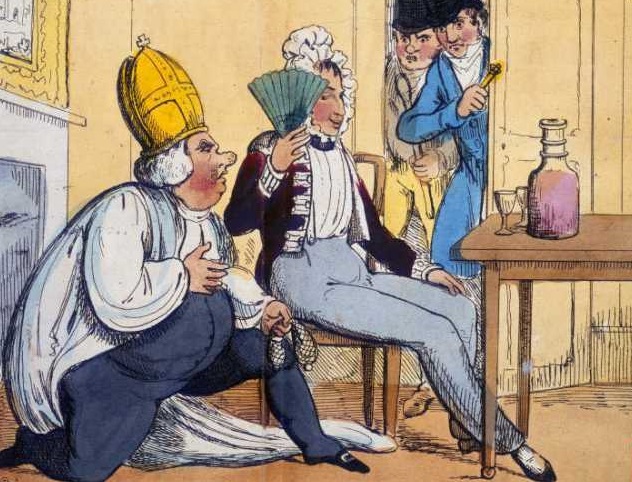
In 1822, Percy Jocelyn was caught in a compromising position with a foot soldier in the back room of a public ale house in London. Since sodomy was viewed as a detestable crime in those days, the two nearly naked men were immediately dragged through the streets by an angry mob, where they were severely beaten. Jocelyn was thrown into custody despite his pleading. At that point, nobody knew who he was. If his true identity became known, one of the greatest scandals of the entire Georgian era would surely erupt.
Unfortunately for Jocelyn, this is exactly what happened. Though he refused to confess his name and title at the trial the next morning, he was eventually forced to reveal who he was in order to receive bail. He was allowed to leave quietly through a back entrance, and his name was initially suppressed. By the end of the following week, however, everyone knew that the primary perpetrator of the scandalous incident was the Lord Bishop of Clogher, grandson of the Lord Chancellor of Ireland, brother of the second Earl of Roden, and prominent member of the Society for the Suppression of Vice.
Jocelyn was roasted in the press of the day, becoming the subject of ribald rhymes and satirical cartoons. It soon came to light that he had previously been accused of the same crime back in Ireland. James Byrne, a coachman, had made the allegation in a letter to the lord mayor of Dublin. As a result, the innocent Byrne had been prosecuted for malicious libel and unjustly flogged to within an inch of his life. Amends were made, though Byrne was never officially pardoned. As for Jocelyn, he broke bail and first fled to France before secretly returning to Britain years later, where he lived out the rest of his life under a false name in Scotland, serving as a butler.
4Reverend John Selby Watson
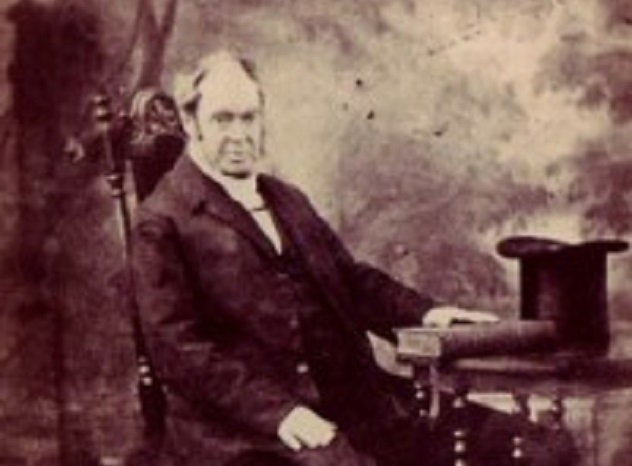
The Reverend John Selby Watson was a classical scholar of some renown. He served as the headmaster of a grammar school for more than 25 years and authored many books. He was regarded as a kind man of good reputation, so his maid suspected nothing when she returned one night to be told that her mistress, Watson’s wife, had suddenly gone away on a trip. The house seemed to be in order except for some red stains, which the Reverend explained had been caused by an accidental wine spill. A door in the library was also locked, and the maid was instructed not to approach it. Besides these irregularities, nothing seemed untoward until several days later.
The maid returned home once again, and this time, she found her master seriously ill and called for a doctor. Watson had taken prussic acid in an attempt to kill himself. A letter left on a desk confirmed that he had also murdered his wife. Watson wrote “In a fit of fury I have killed my wife. Often and often have I endeavored to restrain myself, but my rage overcame me, and I struck her down. Her body will be found in the little room off the library. I hope she will be buried as becomes a lady of birth and position. She is an Irish lady, and her name is Anne. The key will be found in a letter on the table.”
The doctor and the maid discovered the body of Watson’s wife in a dark, almost purple pool of blood in a corner of the room, having been violently beaten to death. Her temples were caved in, and her body still oozed from multiple wounds. Watson pleaded insanity but was condemned to death.
Think we’re all behind the times? Find out with Why Priests?: A Failed Tradition at Amazon.com!
3Reverend William Jackson
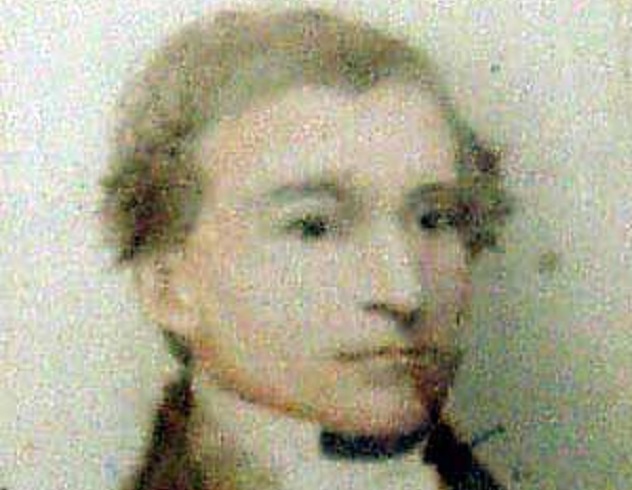
The Reverend William Jackson was born in Dublin, Ireland. After studying at Oxford, he was ordained and moved to London. He took the position of curate at St. Mary-le-Strand and preached at the Tavistock Chapel. For some reason, he abandoned his vocation after this, becoming a journalist. As editor of The Public Ledger in the mid-1770s, Jackson took a decidedly un-Christian path, viscously attacking people through his poisonous writings.
Jackson’s habit of attacking people in the press came to a head when he entered a feud with dramatist and actor Samuel Foote. Jackson made the serious accusation that Foote had made homosexual advances towards a servant, leading to charges of sodomy. Foote’s former footman even stood up in court to charge Foote with attempts to commit an unnatural crime upon his person, but the judge acquitted Foote, believing the whole thing to be a vengeful conspiracy. Foote was spared a potentially fatal conviction, but the strain of the trial and public scandal were believed to have ruined his health. Foote died soon afterward.
For reasons that remain mysterious, Jackson next went to stay in France for several years. Reports of his death circulated in London, but he reappeared in Britain some years later. Inspired by the revolutionary thinking of the time, he was now serving as an agent for the French government. He traveled to Ireland in an attempt to assess whether an invasion, with the intent of bringing down the British monarchy, might be possible. He was arrested and scheduled to stand trial for high treason in Dublin but poisoned himself before the trial commenced. When his symptoms became obvious, the judge ordered that Jackson be removed for medical attention, but he was already dead.
2Ralph Rowe

Ralph Rowe was a priest for the Anglican church of Canada, a Boy Scout leader, and one of Canada’s most prolific pedophiles. Investigators believed he abused his position and power to molest over 100 boys (and possibly as many as 500) from more than 20 native Canadian communities over a period of almost two decades. While it cannot be proven conclusively, the native Canadian people believe Rowe’s abuse was indirectly linked to as many as 18 suicides within their communities.
Rowe molested his victims during Scout outings and trips to remote northern communities to lead church services in the 1970s and ’80s. He was charged with 50 counts of child sex abuse, but the full extent of his crimes may never be known. Victims who received out-of-court settlements signed confidentiality clauses, which hindered them from speaking publicly about the abuse.
Lawsuits were also brought against the Boy Scouts of Canada as an organization. It was said that the Boy Scouts of Canada had failed to make appropriate inquiries that would have revealed earlier allegations of sexual misconduct on Rowe’s part. The Boy Scouts denied these allegations, while attempts to place some of the responsibility on the Anglican Church of Canada were dismissed in court due to legal technicalities.
1Reverend Doctor Edward Drax Free
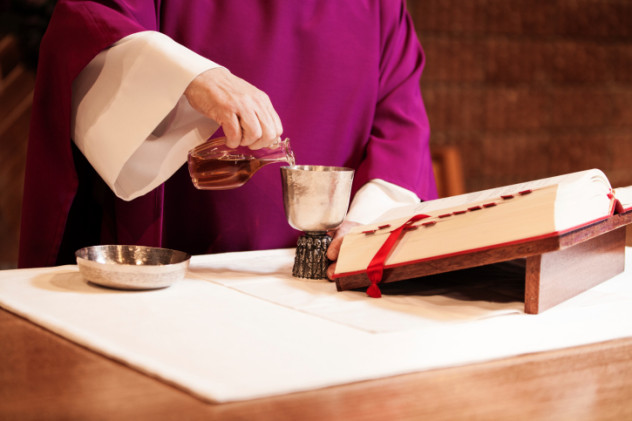
Edward Drax Free must have been a remarkably intelligent man, but sheer audacity was his most outstanding quality. Even his stellar academic career at Christ’s College in Oxford was stained by outrageous behavior that almost got him expelled. Perhaps this was why he was given the obscure position of parish rector in the backwoods hamlet of Sutton, Bedfordshire, but even this tiny village was insufficiently remote to contain the spread of his infamy. By the end of his career, Free had thoroughly established his reputation as one of the worst Anglican clerics of the 1800s, if not all time.
While seducing and impregnating a series of housekeepers, Free spent most of his stipend on booze. Most of the time, he was too busy or too hungover to even bother attending church. Other, more important projects frequently occupied his attention, such as collecting pornography, felling almost every oak tree in the parish to sell off the timber, or stripping the lead from the church roof.
Free did show up for a few important events, such as baptisms and funerals, but this was typically because he had charged his parishioners extortionate sums in exchange for his services. Some of these parishioners tried to sue Free in court, but being an expert in law, Free managed to delay removal from his position for decades. He quarreled with many of his flock, which led to a huge drop in church attendance. This was doubtlessly convenient, since Free could then better profane the church grounds by utilizing them as a pen for his money-raising herds of livestock. He stored fodder in the vestibule, while a number of pigs and horses were left to roam and disturb the gravestones.
Free’s legal shenanigans finally went too far when he ironically tried to sue the village squire for not attending church. After the scheme backfired, he barricaded himself in the rectory with a pistol while authorities laid siege to the building in order to evict him. Free held out for days, helped by some sympathetic locals who smuggled him in some bread, but he was eventually ousted and stripped of his position. He lived to be 78 before God finally smote him in a fatal horse and cart accident.
HTR Williams is a freelance writer, essayist, and fiction author. To read more, please visit htrwilliams.com

